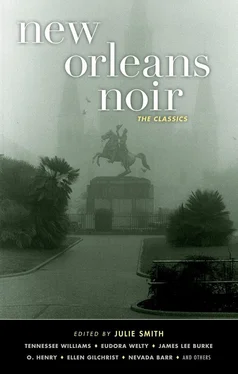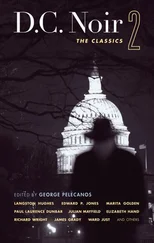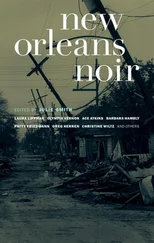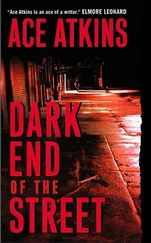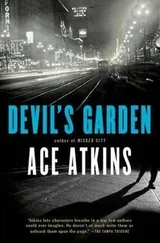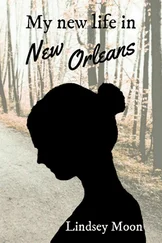Ace Atkins - New Orleans Noir - The Classics
Здесь есть возможность читать онлайн «Ace Atkins - New Orleans Noir - The Classics» весь текст электронной книги совершенно бесплатно (целиком полную версию без сокращений). В некоторых случаях можно слушать аудио, скачать через торрент в формате fb2 и присутствует краткое содержание. Город: New York, Год выпуска: 2016, ISBN: 2016, Издательство: Akashic Books, Жанр: Детектив, на английском языке. Описание произведения, (предисловие) а так же отзывы посетителей доступны на портале библиотеки ЛибКат.
- Название:New Orleans Noir: The Classics
- Автор:
- Издательство:Akashic Books
- Жанр:
- Год:2016
- Город:New York
- ISBN:978-1-61775-384-8
- Рейтинг книги:3 / 5. Голосов: 1
-
Избранное:Добавить в избранное
- Отзывы:
-
Ваша оценка:
- 60
- 1
- 2
- 3
- 4
- 5
New Orleans Noir: The Classics: краткое содержание, описание и аннотация
Предлагаем к чтению аннотацию, описание, краткое содержание или предисловие (зависит от того, что написал сам автор книги «New Orleans Noir: The Classics»). Если вы не нашли необходимую информацию о книге — напишите в комментариях, мы постараемся отыскать её.
takes a literary tour through some of the darkest writing in New Orleans history.
New Orleans Noir: The Classics — читать онлайн бесплатно полную книгу (весь текст) целиком
Ниже представлен текст книги, разбитый по страницам. Система сохранения места последней прочитанной страницы, позволяет с удобством читать онлайн бесплатно книгу «New Orleans Noir: The Classics», без необходимости каждый раз заново искать на чём Вы остановились. Поставьте закладку, и сможете в любой момент перейти на страницу, на которой закончили чтение.
Интервал:
Закладка:
He had found the red album the night before, after his wife’s funeral. Indulging his grief after the desolate service and the miserly reception of chips and soft drinks at her sister’s, he had sunk to his knees before Emily’s hope chest at the foot of their bed, fingering the silk negligee bruised brown with age, inhaling the distant scent of gardenias on the bodice of an old evening gown, burying his arms in all the tenderly folded velvet and satin. It was his burrowing hand that discovered the album at the bottom of the trunk.
At first, he did not know who it was, the face growing younger and younger with each page. But soon enough, he began to suspect. And then, on the very last leaf of the red binder, he recognized the combed hair and fragile smile of the little boy who returned his gaze from a school photograph.
As he thought of Emily secretly thumbing through the age progressions, each year on Kevin’s birthday adding a new portrait on top of the one from the year before, he felt the nausea rising in his throat and took a deep breath. It’s just another kind of memory, he told himself, defending her.
He, for example, still could not forget the green clock on the kitchen wall that had first reminded him his son should be home from school already. Nor could he forget the pitiless clack of the dead bolt as he had unlocked the door to see if the boy was dawdling down the sidewalk. And he would always remember stepping onto the front porch and catching, just at the periphery of his vision, the first glimpse of the pulsing red light, like a flower bobbing in and out of shadow.
In fact, turning his head in that small moment of uncertainty, he took the light to be just that: a red rose tantalized by the afternoon’s late sun but already hatched with the low shadows of the molting elms that lined the street. And he remembered that as he turned toward the flashing light, lifting his eyes over the roses trellised along the fence — the hybrid Blue Girl that would not survive the season, twined among the thick canes and velvet blossoms of the Don Juan — and even as he started down the wooden steps toward the front gate, slowly, deliberately, as if the people running toward the house, shouting his name, had nothing to do with him, he continued to think rose, rose, rose.
Mussolini and the Axeman’s Jazz
by Poppy Z. Brite
(Originally published in 1995)
Basin Street
Sarajevo, 1914
Stone turrets and crenelated columns loomed on either side of the Archduke’s motorcade. The crowd parted before the open carriages, an indistinct blur of faces. Francis Ferdinand swallowed some of the unease that had been plaguing him all day: a bitter bile, a constant burn at the back of his throat.
It was his fourteenth wedding anniversary. Sophie sat beside him, a bouquet of scarlet roses at her bosom. These Serbs and Croats were a friendly crowd; as the heir apparent of Austria-Hungary, Francis Ferdinand stood to give them an equal voice in his empire. Besides, Sophie was a Slav, the daughter of a noble Czech family. Surely his marriage to a northern Slav had earned him the sympathy of these southern ones.
Yet the Archduke could not divest himself of the notion that there was a menacing edge to the throng. The occasional vivid detail — a sobbing baby, a flower tucked behind the ear of a beautiful woman — was lost before his eyes could fully register it. He glanced at Sophie. In the summer heat he could smell her sweat mingling with the eau de parfum she had dabbed on this morning.
She met his gaze and smiled faintly. Beneath her veil, her sweet face shone with perspiration. Back in Vienna, Sophie was snubbed by his court because she had been a lady in waiting when she met the Archduke, little better than a servant in their eyes. Francis Ferdinand’s uncle, the old Emperor Francis Joseph, forbade the marriage. When the couple married anyway, Sophie was ostracized in a hundred ways. Francis Ferdinand knew it was sometimes a painful life for her, but she remained a steadfast wife, an exemplary mother.
For this reason he had brought her on the trip to Sarajevo. It was a routine army inspection for him, but for her it was a chance to be treated with the royal honors she deserved. On this anniversary of their blessed union, Sophie would endure no subtle slights, no calculated cruelties.
The Archduke had never loved another human being. His parents were hazy memories, his uncle a shambling old man whose time had come and gone. Even his three children brought him more distraction than joy. The first time he laid eyes on Sophie, he discerned in her an empathy such as he had never seen before. Her features, her mannerisms, her soft ample body — all bespoke a comfort Francis Ferdinand had never formerly craved, but suddenly could not live without.
The four cars approached the Cumuria Bridge. A pall of humidity hung over the water. The Archduke felt his skin steaming inside his heavy uniform, and his uneasiness intensified. He knew how defenseless they must look in the raised carriage, in the Serbian sun, the green feathers on his helmet drooping, Sophie’s red roses beginning to wilt.
As they passed over the bridge, he saw an object arc out of the crowd and come hurtling toward him. In an instant his eye marked it as a crude hand bomb.
Francis Ferdinand raised his arm to protect Sophie and felt hot metal graze his flesh.
Gavrilo Princip’s pistol left a smell on his palm like greasy coins, metallic and sour. It was a cheap thing from Belgium, as likely to blow his hand off as anything else. Still, it was all Gavrilo had, and he was the only one left to murder the villainous fool whose good intentions would crush Serbia.
He had known the other six would fail him. They were a young and earnest lot, always ready to sing the praises of a greater Serbia, but reluctant to look a man in the face and kill him. They spoke of the sanctity of human life, a short-sighted sentiment in Gavrilo’s opinion. Human life was a fleeting thing, an expendable thing. The glory of a nation could endure through the ages. What his comrades failed to fully comprehend was that it must be oiled with human blood.
He raked his dirty hair back from his face and stared along the motorcade route. It looked as if the cars were finally coming. He took a deep breath. As the wet, sooty air entered his lungs, Gavrilo was seized with a racking cough that lasted a full minute. He had no handkerchief, so he cupped his hand over his mouth. When he pulled it away, his fingers were speckled with fresh blood. He and his six comrades were all tubercular, and none of them expected to live past thirty. The fevers, the lassitude, the night sweats, the constant tickling itch deep in the chest — all these made the cyanide capsules they carried in their pockets a source of comfort rather than of dread.
Now the task was left to him. Mohammed and Nedjelko, the first two along the route, were carrying hand bombs. One of them had heaved his bomb — Gavrilo had seen it go flying — but the motorcade had continued toward City Hall with no apparent damage. His comrades between Cumuria Bridge and City Hall — Vasco, Cvijetko, Danilo, Trifko — had done nothing.
The Archduke’s carriage moved slowly through the crowd, then braked and came to a standstill less than five feet from Gavrilo. This struck him as nothing short of a miracle, God telling him to murder the villains for the glory of Serbia.
He fired twice. The pistol did not blow his hand off. He saw Countess Sophie sag against her husband, saw blood on the Archduke’s neck. The deed was done as well as he could do it. Gavrilo turned the pistol on himself, but before he could fire, it was knocked out of his hand. The crowd surged over him.
Gavrilo got his hand into his pocket, found the cyanide capsule and brought it to his mouth. Hundreds of hands were ripping at him, pummeling him. His teeth cracked the capsule open. The foul taste of bitter almonds flooded his mouth. He retched, swallowed, vomited, convulsed. The crowd would surely pull him to pieces. He felt his guts unmooring, his bones coming loose from their sockets, and still he could not die.
Читать дальшеИнтервал:
Закладка:
Похожие книги на «New Orleans Noir: The Classics»
Представляем Вашему вниманию похожие книги на «New Orleans Noir: The Classics» списком для выбора. Мы отобрали схожую по названию и смыслу литературу в надежде предоставить читателям больше вариантов отыскать новые, интересные, ещё непрочитанные произведения.
Обсуждение, отзывы о книге «New Orleans Noir: The Classics» и просто собственные мнения читателей. Оставьте ваши комментарии, напишите, что Вы думаете о произведении, его смысле или главных героях. Укажите что конкретно понравилось, а что нет, и почему Вы так считаете.
